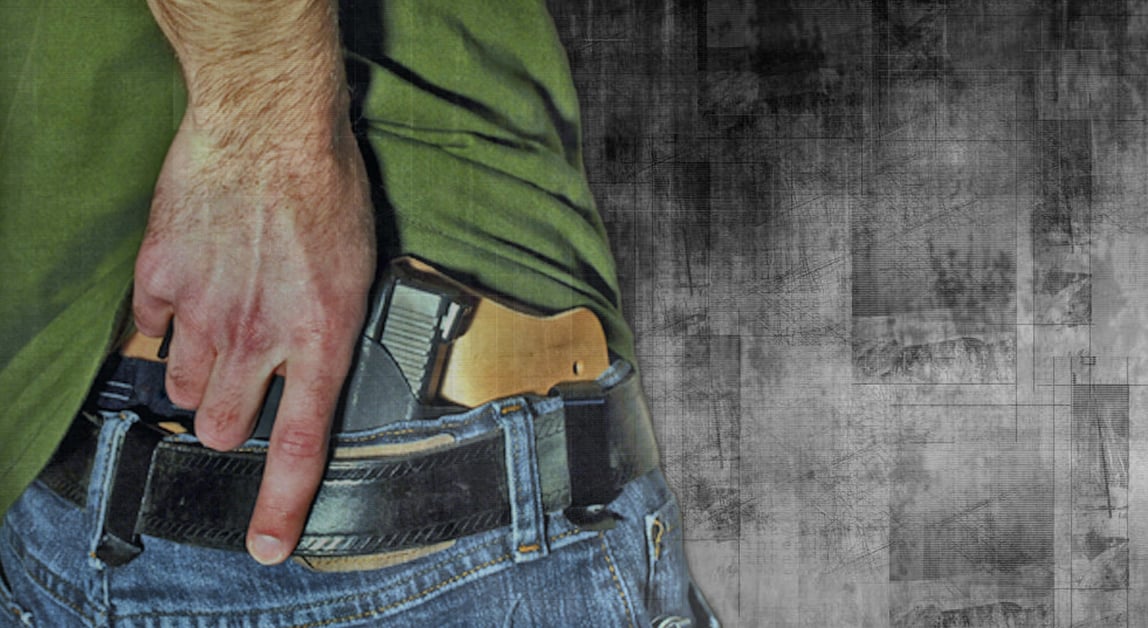By Robert Farago. Republished with permission from TheTruthAboutGuns.com
Your legal right to use deadly force (i.e. shoot someone) varies from state to state. This article gives you some basic guidelines on the legal use of deadly force. What you are about to read is not legal advice. I am not a lawyer. After you finish here, Google “deadly force YOUR STATE HERE” and read your state’s law. If you have any questions or concerns, contact your local NRA chapter. Take a Use of Deadly Force class. Do not call the police. Just as they have no legal obligation to protect you (true story) they have no legal obligation to give you accurate legal advice. OK, so, we begin with another disclaimer . . .
At the end of the proverbial day, if you shoot someone, a number of people will decide whether or not you were legally justified in doing so. The police will decide whether or not to arrest you. A District Attorney/Prosecutor will decide whether or not to charge you with a crime. Should the incident proceed to trial, a judge or jury will decide whether or not you had a legal right to fire your weapon.
In most states, juries use the “reasonable person” standard to determine guilt or innocence. Would a reasonable person in the same circumstances fire their weapon? We’re talking the totality of circumstances here. Considerations include your age, weight, height, sex, physical health and life experience; the bad guy(s) age, height, sex, appearance and actions; the type of threat (weapons?); the reason for the threat (robbery? rape? knockout game?). The exact situation as it unfolded: who, what, when, where and why. Everything. All of it.
Regardless of the reasonable person standard, you should know your state’s rules for the legal use of deadly force. You should have these rules clear in your mind before you pick up your gun. If you know when you can bring our weapon to bear on the bad guy or guys, you will do so with less doubt and more confidence. If you know when you can’t shoot, you’ll keep your powder dry and avoid a whole lot of legal, moral and financial trouble down the line. Maybe . . .
Generally speaking, lethal force is permissible when you or other innocent life face an imminent, credible risk of death or grievous bodily harm, and imminence is imminent. Let’s start at the end of that sentence and work our way to the beginning.
“Imminence is Imminent”
People use the word “imminent” to describe something they think is about to happen. “I could tell the bad guy was about to attack me from the way he looked at me and his racial slurs.” So “the attack was imminent.” Nope. The word “imminent” means something quite specific when it comes to armed self-defense. It means an attack in the process of happening. Hence the codicil “and imminence is imminent.” You weren’t thinking someone was about to attack you. They were in the act of attacking.
Even if it’s a group of previously convicted criminals revving their Harleys and shouting that they’re going to gut you like a fish, even if it’s a blood-soaked knife-wielding maniac waving a knife in the air, you can’t shoot them until they begin their attack.
OK, you can. As I said above, it’s up to the police, prosecutor, judge or jury to decide if your use of lethal force was justified. They may or may not make allowances for your state of mind. Even so, the mental tripwire for the using your firearm should be “I’m being attacked.” You may have the legal right to “stand you ground,” but up to that point, escape and evade are your two best friends.
“Death or grievous bodily harm”
If someone attacks you with a pillow, you are not at risk of death or grievous bodily harm. Unless you’re lying in a bed and they’re using the pillow to try to smother you. If someone pinches you, you are not at risk of death or grievous bodily harm. Unless they’re “pinching” your testicles with a pair of pliers. If someone slaps you, you are not at risk of death or grievous bodily harm. Unless they’re slapping you with brass knuckles.
See how that works? The possibility of suffocation, broken bones, head injuries, stab wounds, gunshot wounds – they all count as grievous bodily harm. Bumps and bruises don’t. It’s simple common sense, really. Unless it isn’t . . .
You, reasonable person that you are, may have had good reason to think you were in danger of death or grievous bodily harm when you fired your weapon, but actually weren’t. Very much. If at all. Or were you? How bad was that fight when you pulled your gun – or how bad was it going to get? (See: use of force continuum.)
What if someone enters your house to rob it but they don’t actually attack you? Is that cause enough to shoot them? What if they’re carrying a gun? What if you warn them to leave and they don’t? What if you don’t want them and lay in wait and then shoot them? It’s a legal grey area or, if you prefer, a minefield.
That said, in most but not all jurisdictions, your home is your castle; invaders are viewed as an inherent lethal threat (hence “the castle doctrine“). When you use your firearm outside the home, things can get awful hinky, legally speaking. For example, some states apply the castle doctrine to your car or place of business. Some don’t.
Either way, this raises an important point: just because you can shoot someone legally doesn’t mean you should. Unless the threat of death or grievous bodily harm is completely clear, you may want to escape, evade or, perhaps, brandish your weapon as a warning.
[Note: some states allow the use of lethal force for other reasons, such as preventing kidnapping, theft or arson. Check your state’s laws.]
“Credible Threat”
If a 10-year-old boy points a pen knife at you from twenty feet away, that’s not a credible threat of death or grievous bodily harm (nor is imminence imminent). If a bad guy steps out of the shadows right in front of you with a kitchen knife aimed at your heart, that is. If someone points a gun at you intending to do you harm (as opposed to, say, sweeping you with their muzzle at a gun range), that’s a credible threat. It all comes down to how likely the threat is to be successful if you don’t stop it by deploying lethal force.
Again, your opinion on the matter is subject to the authorities’ and jury’s opinion under the “reasonable person” standard. Again, they will base their decision on the totality of the circumstances surrounding the defensive gun use. And again, that determination varies according to state law and the local culture. Remember: there are states where you have a so-called “duty to retreat.” (Click here for a list.) These states are likely to have a high standard for what constitutes a credible threat. And imminence. And grievous bodily harm.
“Innocent life”
If you’re minding your own business, you are the innocent party. You are legally allowed to use lethal force to stop an imminent, credible threat of death or grievous bodily harm – provided imminence is imminent, subject to the usual caveats and official second-guessing. Same goes if someone else is minding their own business when they face an imminent, credible threat of death or grievous bodily harm, and imminence is imminent. You are legally allowed to use lethal force to stop the threat against them – subject to the usual caveats and official second-guessing.
While you have an excellent idea of when you’re innocent (e.g., not starting a fight), using your gun to protect “other innocent life” is fraught with danger. Let’s say you see a woman being attacked by two men. The violence is severe and she’s screaming rape. You shoot the attackers to save the victim’s life. Only the “attackers” were undercover police trying to arrest a perp. Good luck with that. By the same token, let’s say you shoot a top ‘N Rob clerk thinking he was a robber (they’d switched places during the robber). That’s not going to go well for you, either.
The best bet is to refrain from using lethal force unless you’ve seen the whole incident from its inception. In fact, I’d like to end this article with a simple warning: shooting a bad guy or guys can create enormous disruption to your life; morally, spiritually, financially, socially and legally. It may not, but it can.
If you face an imminent, credible threat of death or grievous bodily harm and imminence is imminent, chocks away – remembering that some state laws on lethal force impose a duty to retreat. If, however, you can find a way not to use lethal force and avoid injury to yourself or other innocent life, that’s your best option. In any case, know the law on lethal force in your state and do your best to avoid stupid people in stupid places doing stupid things. That is all.














![[VIDEO] Store Owner Doesn’t Have Time For Armed Robber’s Games](https://imagedelivery.net/sbm_lYeJbALkepJgtmRD5w/concealednation.org/2014/12/Screenshot-2014-12-23-at-11.48.12-AM.png/w=698,h=381)